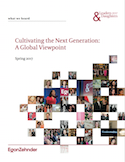Egon Zehnder cares deeply about leadership— and, in particular, the diverse leadership that is necessary for true business success. As the focus of leadership moves from individual excellence to building a culture of high-performance teams, we must cultivate more varied and inclusive leaders who can recognize and nurture the best in people. Developing these leaders is as much a business imperative as it is the right thing to do: If companies want to attract talent, they will have no choice but to improve the diversity within their own ranks. This is why, for the third straight year, we hosted our Leaders & Daughters event series, which we began in London in 2015.
Last year, we expanded the program to 15 locations; this year, we hosted 40 different events in 26 countries, demonstrating our global commitment to the continued development of the next generation of female leadership. The series of roundtable and panel discussions began on February 28 in Bangalore, followed by Hong Kong and London, and then moved around the globe, where they will wrap up in Mexico on June 15. Panelists included C-suite executives from companies such as Pfizer, Vodafone, Apple, Raytheon, New Balance, Mary Kay, American Airlines, Accenture India, Barclays Africa, Russell Stover, Procter & Gamble Chile and GrubHub, current or former senior government officials from the United Kingdom, the United States, Argentina, Colombia, Poland and elsewhere; heads of nonprofits including The Kennedy Center, Global Health Corps, SEED Global Health and Cradles to Crayons, and even such well- known female groundbreakers as three-time solo ocean rower Roz Savage and Bia Figueiredo, the Brazilian IndyCar driver.
Held in the weeks surrounding International Women’s Day (March 8), the spirited panel and roundtable discussions brought together some 3,500 leaders and their daughters or invited mentees to discuss the challenges and opportunities facing the next generation—and what we, collectively, could do to help. Although the topics covered varied at the different events, several common themes emerged. This report encompasses the highlights of the discussions, as well as takeaways useful for any organization dedicated to developing female leaders.
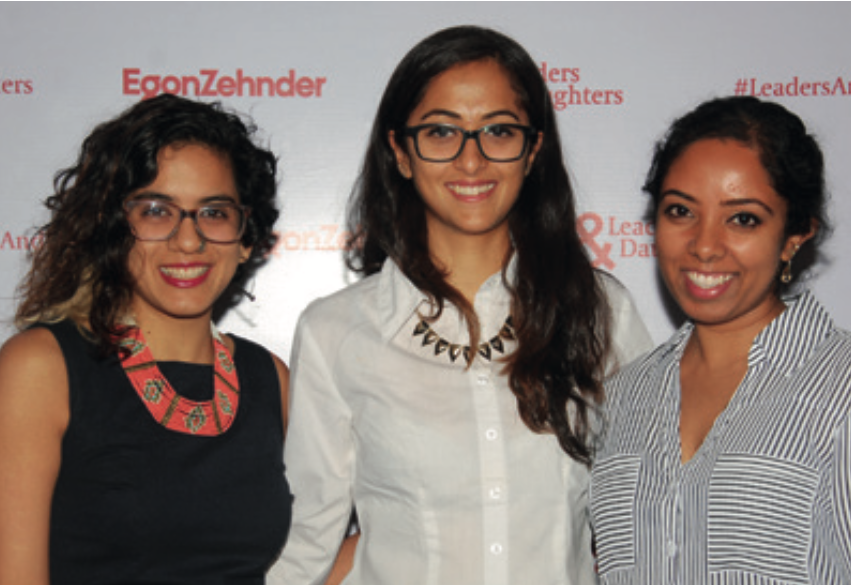
From left to right: Tulsi Menon, Anthropologist at The Womb; Mitali Tandon, Co-Founder of MorningFresh; Shruti Shibulal, Director Strategy & Development at The Tamara
Positive Ambitions, Challenging Realities
At virtually every Leaders & Daughters event, there was a palpable sense of energy and empowerment, particularly on the part of the younger participants. The daughters on stage, as well as those in the audience—who ranged in age from high school to their early 30s—expressed a basic confidence that they could achieve anything they desired with hard work. There was a collective sense of optimism when it came to the ambition of individual women; no one said that they saw any existing cultural or societal barriers keeping them from achieving whatever they wanted to. Several daughters, including Kelly Kennedy, a network engineer at Verizon and the daughter of Raytheon Chairman and CEO Tom Kennedy, said they, too, aimed to become CEOs.
Yet that optimism was somewhat tempered by both the experiences of the leaders on the stage and the results of Egon Zehnder’s Global Leaders & Daughters survey, which measured the professional viewpoints of 7,000 women in seven different countries. The good news, first, is that nearly three-quarters of the respondents in the early stages of their careers aim to reach the top level of their company. This was especially true for women in developing economies such as Brazil, China and India, who reported higher levels of aspiration than women in the United States, Australia, the United Kingdom and Germany.
Yet the survey also measured a dramatic falloff in ambition as women moved further along in their careers; desire to advance to a top position declines at the senior manager level, dropping from 72 percent to 57 percent. We found the same alignment with age. Globally, younger women were more likely to say they eventually wanted to have a senior role—70 percent for women aged 18- 22 versus 20 percent for women aged 51-60.
That may be because for all the collective energy of the younger women, progress at the upper echelons of management remains stunted. In the boardroom, for example, Egon Zehnder’s 2016 Global Board Diversity Analysis shows mixed results. Although there is improvement in some regions—such as Western Europe, where 26 percent of all directors were women in 2016, up from 8 percent in 2004—there are still 11 countries where more than half of the largest companies have no women on their boards. For the last four years, the U.S. has remained stagnant in adding women to boards, with just 1 percent growth between 2012 and 2016. And of the Fortune 500 companies by revenue, less than 5 percent of CEOs are women. Clearly, something significant is occurring between the time women start their careers and get to the midpoint of them.
How to change that dynamic? Both the leaders and daughters at our events pointed to several themes that might make a difference.

From left to right: Jennifer Reingold, Egon Zehnder; Barbara Bush, CEO and Co-founder of Global Health Corps; Sophie Isom and her father Robert Isom, President of American Airlines Group; Sara Holl, Assistant Media Planner at GDS&M, and her father David Holl, President and CEO of Mary Kay; Amanda Humrichouse and her mother Nina Vaca, Chairman and CEO of Pinnacle Group
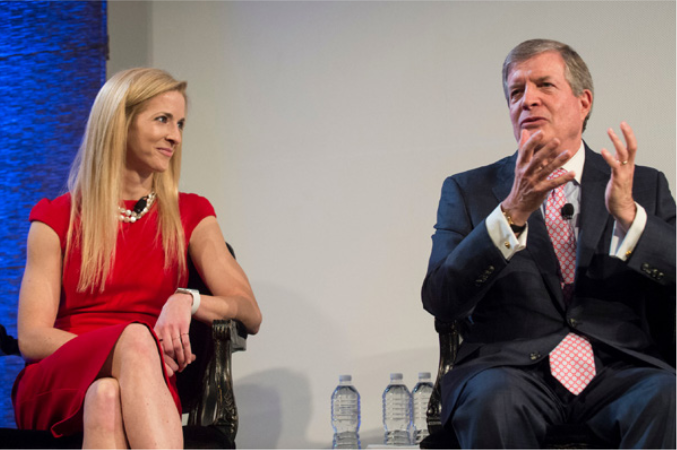
NEW YORK: Catherine Polisi Jones , Founder & President, Polisi Jones Communications, and Dr. Joseph Polisi , President, Juilliard School
Self-esteem must come from within
Many of the Leaders & Daughters discussions focused on macroeconomic barriers to women’s advancement, such as inadequate family leave policies. But virtually all of them emphasized that it was up to women to develop enough self- confidence to stand up for themselves and to stand firm when others doubt them.
This is not always easy, even for women who have reached the top of their industries. Maite de la Arena, Chile Country Manager of P&G until 2016, spoke movingly on the subject. “Sometimes the boundaries women have are self-induced,” she told the Buenos Aires panel on March 9. “When I was offered a job in another country at first I said no because of my family—and then my daughter said ‘Why not?’” The tendency of many women to suppress or conceal their ambition came up frequently. In Johannesburg, Sipho “Hotstix” Mabuse, the famous musician and singer, expressed the idea in terms of his own industry—but it was a sentence applicable to everyone: “Don’t think only of being a backup singer,” he told the daughters gathered on March 8. How, then, to build self-esteem? Pinnacle Group Chairman and CEO Nina Vaca used the term “crazy good” on the Dallas panel to describe how she gives her absolute all to everything. Being “crazy good” means that no one can deny your skills—regardless of age or gender. And in Chicago, restauranteur Alpana Singh shared her “Four Vs” model for career management, incorporating Vision, Validation, Vulnerabiltiy, and, perhaps most important, one’s own Voice. “Find it,” she said, “and don’t be afraid to speak up and use it.”
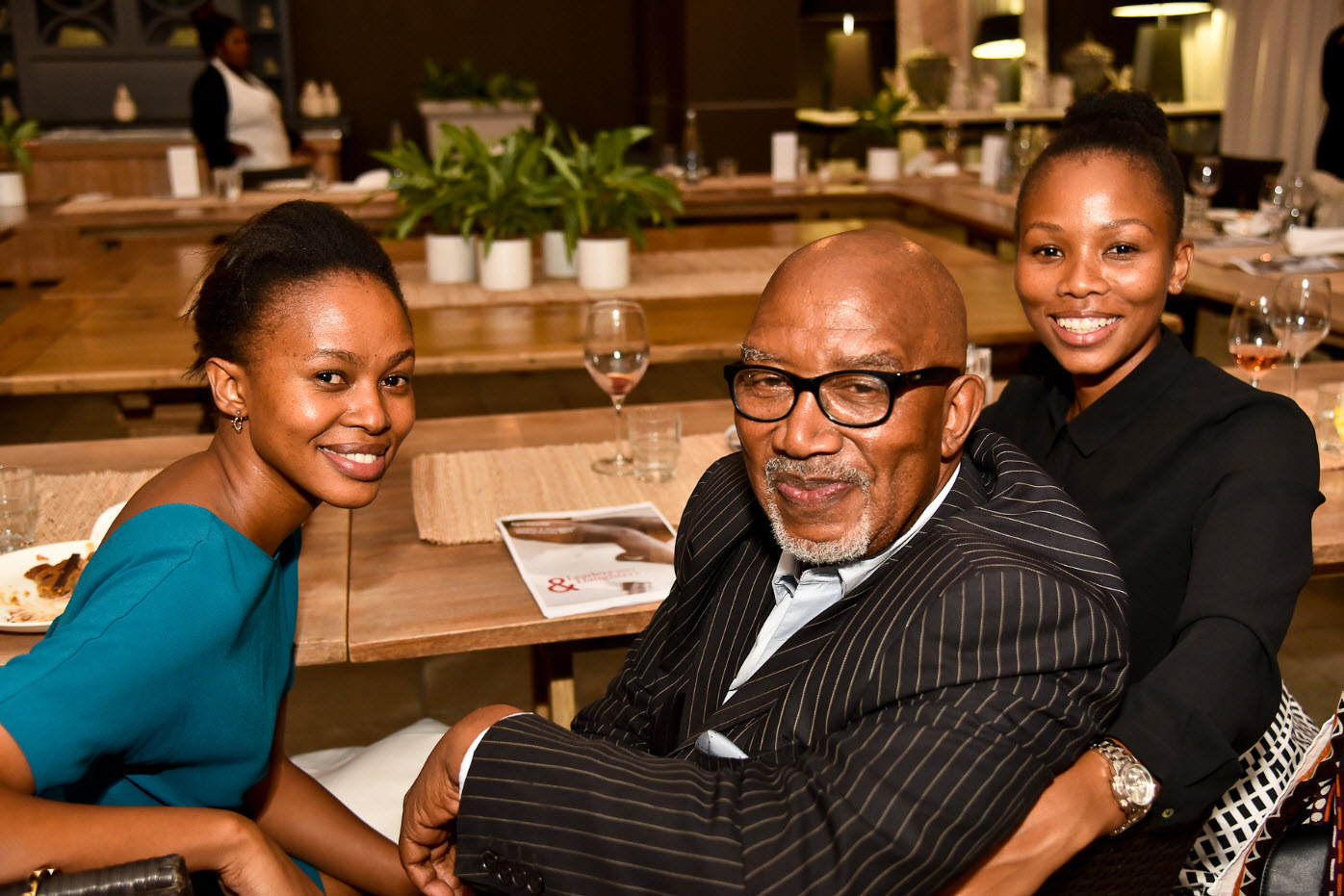
JOHANNESBURG: Sipho “Hotstix” Mabuse, a legendary Afro-rock pioneer, musician and singer, together with Naledi and Palesa
“Don’t think only of being a backup singer.” – Sipho “Hotstix” Mabuse
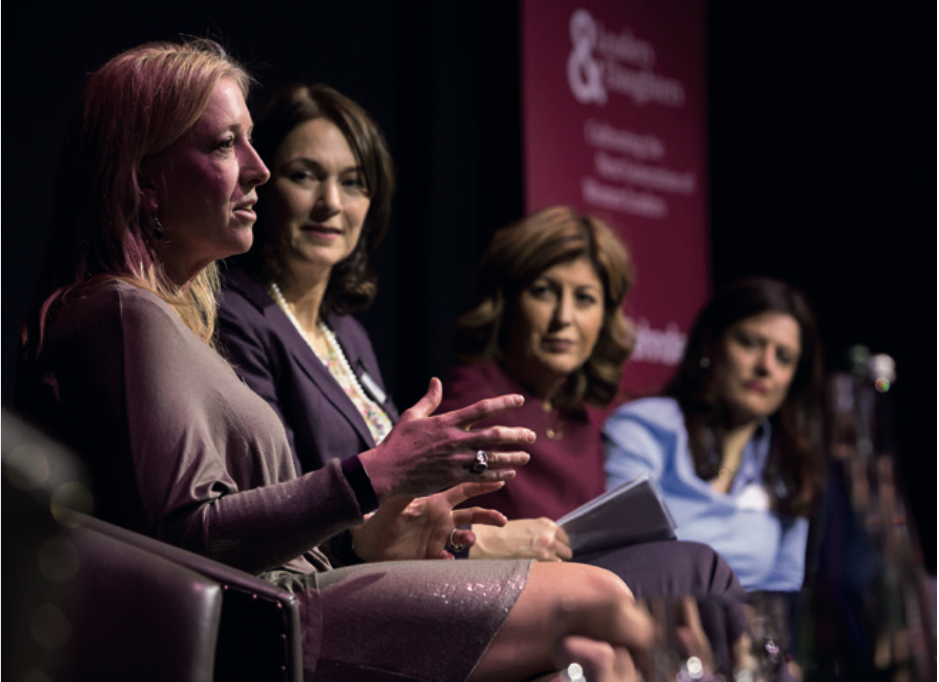
LONDON: Roz Savage , first woman to row across three oceans, Miranda Pode , Egon Zehnder London, Serpil Timuray , Chief Commercial Operations and Strategy Officer, Vodafone, and Miriam Gonzalez , international trade lawyer and founder of Inspiring Girls
“Courage is when your motivation is bigger than your fear.” – Roz Savage
Push beyond your comfort zone
Being a leader is uncomfortable. So getting used to that feeling early is critical for later success, several of the panelists said. Russell Stover CEO Andreas Pfluger spoke eloquently in San Francisco about how he had encouraged his daughter Michele to be a healthy risk-taker. “First, find out what you are passionate about. Two, be curious. And three, leave the comfort zone. Try to push yourself and find out how far you can go.” In Dallas, American Airlines President Robert Isom and his daughter Sophie, a high school junior, shared the story of how they decided to swim the waters around Alcatraz together—something that made Sophie realize what she could accomplish.
Catherine Polisi Jones, head of Polisi Jones Communications, abruptly quit her job, gave up her apartment and went to Asia for six months.
“For me, it was life-changing,” she told the New York audience. “It really put me on a path of learning about people and experiences that I then weaved into my personal and professional life afterwards.” And in London, Roz Savage, a one-time consultant who has rowed across three oceans by herself, put the benefits of going beyond your own boundaries into one stark sentence: “Courage is when your motivation is bigger than your fear.” It may not take rowing across an ocean alone to figure that out, but the principle is a good one: Push yourself early and often so that you can handle what will come later.
Sponsorship over mentorship
Mentorship—in which senior women and men help to support the careers of more junior women by serving as a role model, a friend and a confidante—is a well-established path in the career development of women. Indeed, 55 percent of participants in our Leaders & Daughters global survey said they had a senior leader who acted as an advocate on their behalf.
Even more important, however, according to many of the panelists, is the role of sponsorship, which Brussels keynote speaker Marleen Vaesen, CEO of Greenyard Foods, defined as “someone who talks about you and makes sure people give you the trust to take that extra step in your career.” A sponsor goes much further than a mentor by taking it upon him- or herself to actively and regularly promote the career of a younger person—sometimes even at personal risk to their own reputation.
It is up to the protégée, however, to find that sponsor, said Maxine Brenner, a board member at Origin Energy and Qantas Airways in Sydney. “Young women need to find champions and be unashamed in using them,” she said. “It is a lot more than mentoring. This needs to be someone you have worked closely with, who can vouch for how you perform, and understands your ‘value add.’” This is what Isabella Rich, the daughter of Brenner, did when she started at the Boston Consulting Group. As she told the Sydney gathering, when she started she knew no one there and worried about being lost in a sea of new hires. To make herself noticed, she found out about a group partner whose area interested her and sent him a blind email. She didn’t hear back, but several days later she happened to be introduced to the partner at a meeting. He recognized her from the email, apologized for not replying, and soon became one of her champions within the company.
“Young women need to find champions and be unashamed in using them.” – Maxine Brenner
Role models are critical
Many of the female leaders on the panel related stories of how difficult—but ultimately rewarding—it was to be a groundbreaker. Ina Choi, the first senior female executive at Samsung, told her story in Seoul, offering a personal observation on the added weight women bear.
“It is very lonely to be the first, but you need to endure that time,” she said. “You need the first female executive to be successful in order for that organization to have a second, a third female executive. Otherwise, people would easily believe that female executives won’t work in that organization.” Without a role model to aspire to, it’s hard to aim high. Greenmarket’s Vaesen said that her original goal was to become a mid-tier marketing manager. “This was the highest level in business where I could see a woman,” she recalled. There is progress, most of the attendees insisted— and, indeed, in some countries the statistics are promising. In Russia, for example, 55 percent of the top 100 companies have women directors on their boards—up from 42 percent just five years ago. And yet it is not the statistics that motivate women as much as the real-life examples of success. In San Francisco, Serena Perrin Vinton, SVP and Portfolio Manager at Franklin Templeton Investments, told the story of how she was the first woman ever to have a child and return to a full- time career in her office (she cited a disheartening statistic: Just 4 percent of large-fund money managers are women). Remembering her own struggles, she felt compelled to serve as a mentor and sponsor for fellow panelist Sara Araghi, the only other woman on her team, when she had a child. Araghi now also wants to pave the way for others.
Men must be part of the solution
For all the networking and close ties between women, the reality is that it remains primarily men who are in the position to create change at most organizations—so they therefore need to be included in any solution, many of the leaders emphasized. That means both at home—where both women and men must feel comfortable sharing traditional gender responsibilities—and in the workplace. “In order to get where we want to be, some things must change, and one of them is women’s mindsets,” said Isabel Jonet, president of the food bank NGO Banco Alimentar Contra a Fome, at the Lisbon Leaders & Daughters event. “Women don’t want to give up ownership of the family and management of the children. But for women to advance in their careers they have to start trusting men when it comes to taking care of the family.”
It is also true that men must stop seeing this responsibility as one that belongs only to women—a topic that came up frequently at many of the events, where some women said that little has changed. Indeed, at the Madrid event, several men suggested that women tend to take care of the house and family “because they are better at it.” At several events, the leaders emphasized—only half joking—that an important ingredient for young women’s success was to choose the right partner.
At work, it is critical to make sure that men are included in diversity initiatives—and also to champion and publicize their efforts in the area, even if they are tentative. Denise Young Smith, Apple’s vice president of worldwide human resources, told the story of a developers’ conference she’d been to that was 80 percent male. “We are trying so hard to shift that,” she said at the San Francisco event. “Then these three young male engineers came up to me and said, ‘How can we help?’ I said, ‘Do exactly what you’re doing. Be a part of this conversation. ’”

BOSTON: Rob DeMartini, CEO, New Balance, and his daughter Danielle DeMartini
Some of the male leaders at the Leaders & Daughters sessions noted that having daughters had had a large impact on the way they saw their own companies in terms of providing opportunities for women—and admitted that their own awakening was something of a work in progress. “The cement is still wet,” said Tom Monahan, CEO and Chairman of CEB, at the Washington event, of his own development.
In Boston, New Balance CEO Rob DeMartini admitted candidly that he felt threatened as a white male in his earlier days when other races and genders began to compete for the same jobs. Now DeMartini is focused on making New Balance as welcoming a place as possible for women— something his daughter, Danielle, an assistant merchandiser at Gap Inc., heartily supported.
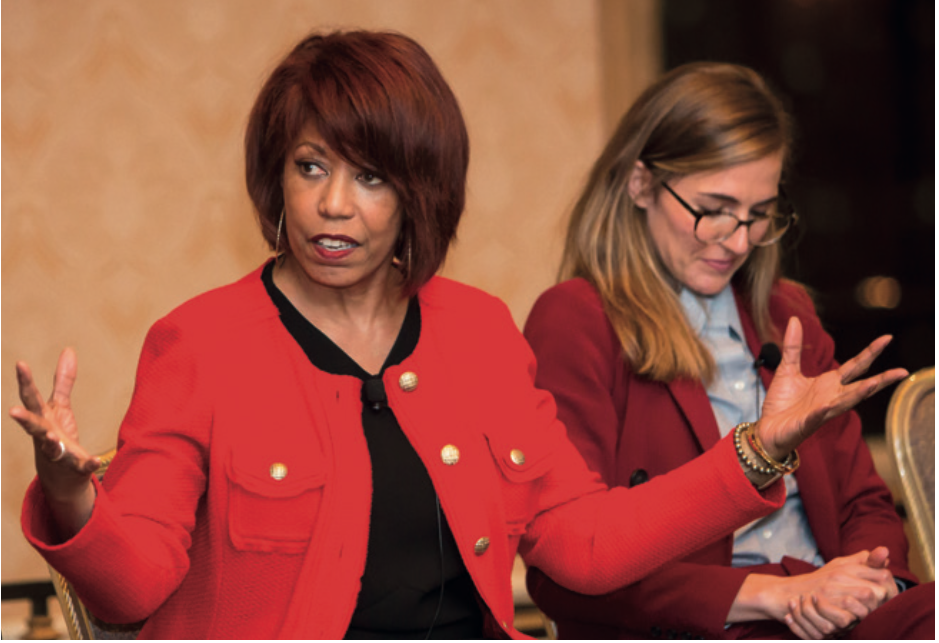
“Do exactly what you’re doing. Be a part of this conversation.” - Denise Young Smith, Vice President of Worldwide Human Resources, Apple
No Diversity = No Millennials
One consistent theme that came through across the globe was just how differently Millennials and Gen Z see the value of a diverse workplace. For them, it is an expectation; two daughters at the Washington event, Lizzie Monahan and Gillian Card, made it clear that they would not be interested in careers at companies that did not value the contributions of different races, genders and mindsets. The conclusion is an important one: Younger people simply will not consider a company that doesn’t take diversity and inclusion seriously.
From a corporate perspective, Apple’s Denise Young Smith told San Francisco Leaders & Daughters participants that the company is completely rethinking the notion of diversity and how to address it. Although Apple has achieved pay parity between women and men—something that many other tech companies have not—she says it’s not all about the current numbers. Instead, companies should be thinking long-term and holistically about how to build true diversity of thought and experience into every part of their operations.
The importance of STEM
With the growth in STEM-related jobs, several participants at the events emphasized how important it is to keep girls from losing interest in math and science—even if that means they are among the only girls in their classes pursuing these subjects. “Not only are we underrepresented,” said Dr. Ellen Stofan, former Chief Scientist at NASA, “we’re often invisible. We lose women and people of color at different stages. We are leaving talent on the table. How can we use research-based solutions to turn this around?”
At the Washington, D.C., event, Elizabeth Sherwood-Randall, former Deputy Secretary for the Department of Energy, said that middle school is the key moment at which girls must be encouraged by parents, teachers and outsiders to continue with advanced STEM coursework. Once girls opt out of this path for any reason, she said, it is virtually impossible to catch up— and, therefore, to compete effectively for STEM- oriented jobs. Also in D.C., high school junior Monahan related the story of her sister, who almost dropped out of advanced math in middle school because it was all boys, but persevered and plans to be a math major at Harvard.
Work/life balance
The topic is perennial, but attitudes on how to deal with it varied significantly by country and by participant. Cultural norms varied widely; in some countries, there was an assumption that women are and will continue to be the ones who make professional sacrifices for the children. “[Women shouldn’t] have to choose between work and family,” said Luisa Fernanda Lafaurie, President of Cenit, at the Bogotá event. “Men are not being put in the position of having to choose in the first place.” Many female leaders talked about how they had to hide that part of their life in order to succeed, as many men assumed that they wouldn’t be interested or couldn’t handle a challenging role because of their family responsibilities.
Other panelists emphasized that companies needed to adopt policies that benefited both men and women if they wanted to change those stereotypes for good. In Bangalore, one attendee pointed out that at Accenture’s local campus, equal numbers of men and women dropped off their children at the day care centers—showing that that policy was for families, not just for women.
Perhaps the biggest difference between the younger and older generations was how they dealt with family obligations. Today, many daughters say that what is most important is to acknowledge, not hide, the other side of their lives. Dr. Vanessa Kerry, founder of SEED Global Health, told a humorous story in Boston about a meeting that she had to attend after her baby spat up on her (she shared the story—and forged a partnership). The key, she said, is to be authentically yourself in the workplace—as a woman and, if relevant, as a wife and mother.
Beyond that, corporate leaders—be they male or female—must recognize the importance of the flexible workforce for everyone. “Today’s leaders have an obligation to influence how a civil society should operate,” Peter Mason, chairman of AusNet Services, said in Sydney. “They need to create flexibility. It might not be easy, but it’s the right thing to do.” Describing the policies at her own communications firm, Polisi Jones put it best: “People also need to be good parents, good spouses and good humans.”
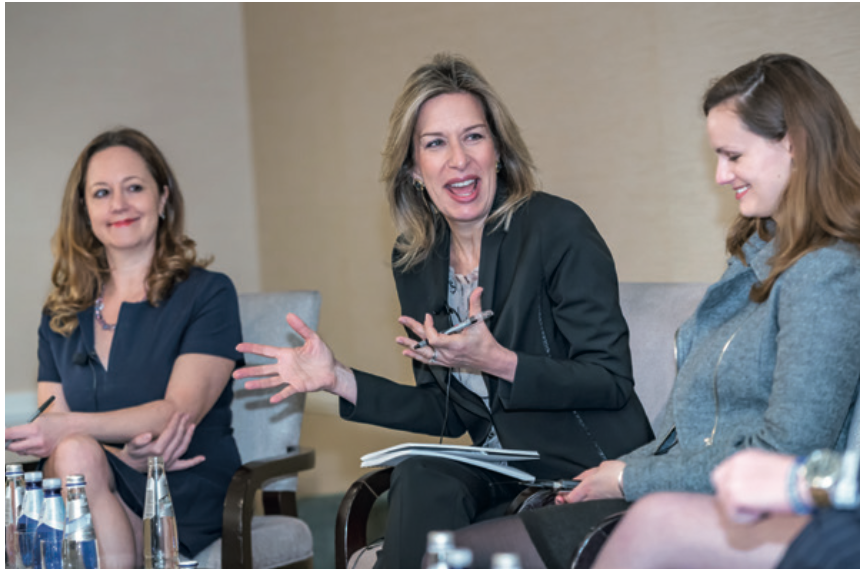
From left to right: Jennifer Reingold, Egon Zehnder; Elizabeth Sherwood-Randall, Former Deputy Secretary, U.S. Department of Energy; Kathryn Grant, Special Advisor for Communications, Office of the Deputy Secretary at U.S. Department of Energy
In addition to the events, we have also launched a campaign, “To My Daughter,” in which leaders from all over the world write letters to their daughters about their hopes and dreams for the future.
Our goal is to create a place for anyone to share advice and lessons for the next generation, thus better preparing this group for leadership. Some of the more than 100 leaders who have participated thus far by writing letters to their own daughters include Angela Ahrendts, Senior Vice President at Apple Retail, Eric Sprunk, COO of Nike, and Super Bowl Champion Martellus Bennett.
About Leaders & Daughters
We host these annual gatherings because if we are to make further progress in diversity in the executive suite and the boardroom, we must involve all stakeholders in seeing equality as more than just an abstract question of policy and governance. We believe that an honest dialogue involving men and women representing a range of industries and perspectives can set in motion new ideas that can grow to have significant impact on this important issue.
If you would like to take part in our initiative, please visit leadersanddaughters.com.
Join the Leaders & Daughters LinkedIn Group, and follow #LeadersAndDaughters on Twitter and on Instagram at @egonzehnder.







